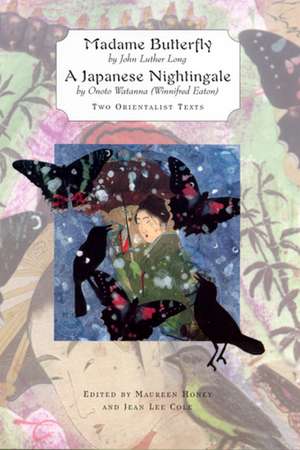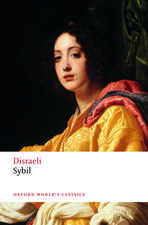'Madame Butterfly' and 'A Japanese Nightingale': Two Orientalist Texts
Editat de Jean Lee Cole, Maureen Honeyen Limba Engleză Paperback – 5 iun 2002
Madame Butterfly (1898) and A Japanese Nightingale (1901) both appeared at the height of American fascination with Japanese culture. These two novellas are paired here together for the first time to show how they defined and redefined contemporary misconceptions of the "Orient." This is the first reprinting of A Japanese Nightingale since its 1901 appearance, when it propelled Winnifred Eaton (using the pseudonym Onoto Watanna) to fame. John Luther Long's Madame Butterfly introduced American readers to the figure of the tragic geisha who falls in love with, and is then rejected by, a dashing American man; the opera Puccini based upon this work continues to enthrall audiences worldwide. Although Long emphasized the insensitivity of Westerners in their dealings with Asian people, the ever-faithful Cho-Cho-San typified Asian subservience and Western dominance. A Japanese Nightingale takes Long's revision several steps further. Eaton's heroine is powerful in her own right and is loved on her own terms. A Japanese Nightingale is also significant for its hidden personal nature. Although Eaton's pen name implied she was Japanese, she was, in fact, of Chinese descent. Living in a society that was virulently anti-Chinese, she used a Japanese screen for her own problematic identity, and A Japanese Nightingale tells us as much about the author's struggle to embrace her Asian heritage as it does about the stereotypes she contests.
Preț: 260.57 lei
Nou
Puncte Express: 391
Preț estimativ în valută:
49.87€ • 54.15$ • 41.89£
49.87€ • 54.15$ • 41.89£
Carte tipărită la comandă
Livrare economică 23 aprilie-07 mai
Preluare comenzi: 021 569.72.76
Specificații
ISBN-13: 9780813530635
ISBN-10: 0813530636
Pagini: 200
Dimensiuni: 152 x 229 x 15 mm
Greutate: 0.37 kg
Ediția:None
Editura: Rutgers University Press
Colecția Rutgers University Press
ISBN-10: 0813530636
Pagini: 200
Dimensiuni: 152 x 229 x 15 mm
Greutate: 0.37 kg
Ediția:None
Editura: Rutgers University Press
Colecția Rutgers University Press
Notă biografică
MAUREEN HONEY is a professor of English and women’s and gender studies at the University of Nebraska-Lincoln. She is the author or editor of numerous works including Shadowed Dreams: Women’s Poetry of the Harlem Renaissance and Double-Take: A Revisionist Harlem Renaissance Anthology (both by Rutgers University Press).
MAUREEN HONEY is a professor of English and women’s and gender studies at the University of Nebraska-Lincoln. She is the author or editor of numerous works including Shadowed Dreams: Women’s Poetry of the Harlem Renaissance and Double-Take: A Revisionist Harlem Renaissance Anthology (both by Rutgers University Press).
MAUREEN HONEY is a professor of English and women’s and gender studies at the University of Nebraska-Lincoln. She is the author or editor of numerous works including Shadowed Dreams: Women’s Poetry of the Harlem Renaissance and Double-Take: A Revisionist Harlem Renaissance Anthology (both by Rutgers University Press).
Cuprins
List of Illustrations
Acknowledgments
Introduction
Note on the Texts
Madame Butterfly by John Luther Long
A Japanese Nightingale by Onoto Watanna Edited by Winnifred Eaton
Appendix
Glossary
Bibliography
Acknowledgments
Introduction
Note on the Texts
Madame Butterfly by John Luther Long
A Japanese Nightingale by Onoto Watanna Edited by Winnifred Eaton
Appendix
Glossary
Bibliography
Descriere
Madame Butterfly (1898) and A Japanese Nightingale (1901) both appeared at the height of American fascination with Japanese culture. These two novellas are paired here together for the first time to show how they defined and redefined contemporary misconceptions of the "Orient." This is the first reprinting of A Japanese Nightingale since its 1901 appearance, when it propelled Winnifred Eaton (using the pseudonym Onoto Watanna) to fame. John Luther Long's Madame Butterfly introduced American readers to the figure of the tragic geisha who falls in love with, and is then rejected by, a dashing American man; the opera Puccini based upon this work continues to enthrall audiences worldwide.








